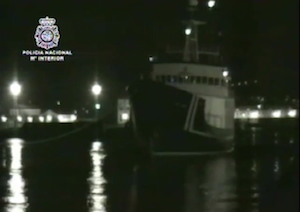Philip Halliday is a former scallop fisherman from Digby, Nova Scotia, who found himself in a bit of trouble. The story about him begins on Dec. 11, 2009. He is aboard the Destiny Empress, a 190-foot former Coast Guard vessel seemingly empty of cargo that he had been hired to sail from the Caribbean to Spain. Six days out, the ship is surrounded, shots are fired and they are boarded. It gets worse:
"Halliday was on his way back to the wheelhouse when somebody came up the stairs behind him and slammed him to the floor. Winded, he drew himself up, but his assailant kicked him in the stomach and flattened him again. He felt the man's knee pressing him into the steel floor, now strewn with broken glass.
"The man tied Halliday's hands behind his back and dragged him across the passageway, yelling at him to keep his head turned. Halliday was certain pirates had boarded the vessel. He thought, There's nothing on this ship! We're dead."
The Destiny Empress after she was seized by Spanish police. Screenshot via YouTubeThe armed men led Halliday to his cabin. Inside was a safe. When asked where the key was, Halliday said he had no idea.
Whether or not he was telling the truth is the key question of Noah Richler's story, "The Trials of Philip Halliday," in The Walrus. As you might have guessed, those pirates were police and the cargo was one and a half tons of cocaine (it was not in Halliday's cabin but in a pressurized compartment at the very bottom of the ship).
Was Halliday a naive fisherman or in on the drug deal? Read the story, which looks at Halliday's life as a commercial fisherman, his journey to the Destiny Empress and trial, and judge for yourself. You might know someone just like him.
Longreads like Richler's article are one of my favorite things on the Internet. Sites like longform.org that collect long-form articles from a wide variety of sources can suck me in for hours like a good book. Among these great reads are other pieces about commercial fishing and fishermen that I've listed below. Some are recent and some go back a few years.
What I like about them all is that they never skim the surface. It seems like so much of what we call reading online isn't reading at all. People read headlines and comment on a story without even reading it. Why bother? They've already made up their mind about the story's topic and won't be convinced otherwise. Click-hungry websites are willing participants in these quick jump-arounds.
But good writing will hook the curious reader and educate them about the topic. Not to sound too corny, but isn't greater understanding something we should all be striving for? When that topic's commercial fishing I believe longform articles can help the general public understand the industry and the people who work in it. Businessweek's story on the Gloucester fish wars, while not entirely sympathetic to the fishermen, may provide some understanding about that community's animosity toward law enforcement.
Most of all, I'm a sucker for a good survival story, which is why I've included both the recent story of John Aldridge's fall off a lobster boat off Long Island and an excerpt about the Essex, a ship that fought a whale and lost. Survival stories always make me think about how I would have acted if I had been in those harrowing situations. Hopefully, I'll never know.
If you're a fan of articles about commercial fishing, you should also be reading National Fisherman (if you don't already). We cover news about boats and gear as well as at-sea and big-issue stories, but these are true page-turners. You must be a magazine subscriber to read them. You can learn more about us and sign up here.
If you are a subscriber, thank you for reading.
"A Speck in the Sea"
Paul Tough, The New York Times, January 2014
Looking back, John Aldridge knew it was a stupid move. When you're alone on the deck of a lobster boat in the middle of the night, 40 miles off the tip of Long Island, you don't take chances.
"The Gloucester Fish War"
Brendan Borrell, Businessweek, November 2011
The bidding starts early at the seafood auction in Gloucester, Mass. Each day about 30 tons of fish — mostly cod, haddock, and flounder — come in by boat on Cape Ann, a fist jutting into the Atlantic Ocean.
"The Frozen Ladder"
Julia Grønnevet, n+1, November 2010
Going fishing is called, in dialect, "fær på sjøen." It was something boys in Norway did when society couldn't hold them anymore. I took it for granted I should be allowed to do it too.
"The Whale and the Horror" (excerpted from "In the Heart of the Sea: The Tragedy of the Whaleship Essex")
Nathaniel Philbrick, Vanity Fair, May 2000
Like a giant bird of prey, the whaleship moved lazily up the western coast of South America, zigging and zagging across a living sea of oil. For that was the Pacific Ocean in 1821, a vast field of warm-blooded oil deposits known as sperm whales.







